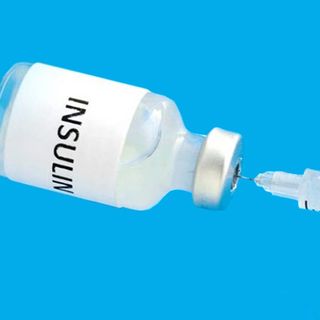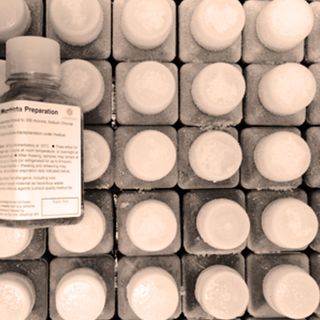
The Postpartum Complication Often Mistaken for New‑Mom Stress, or Postpartum Depression
Postpartum thyroiditis is a hormone imbalance that requires treatment.

Six weeks after her second delivery, S., 32, knew something was off with her body.
“After my first pregnancy, I lost a lot of hair, so this time when I was losing clumps at a time, I thought it was normal. But I was also so worn out, as if I was always running marathons and at the same time, I couldn’t sleep. The insomnia was rampant,” she remembers.
Then she noticed a lump in her throat and and visited her gynecologist. Her doctor ran a couple of blood tests, checked her blood pressure, and then asked S. to hold out her hands. “They immediately shook and I clenched my fists to stop the shaking, but when I opened again, it started,” she says. “The doctor could see the concern on my face and assured me it was okay — but how could I have not noticed this? How could I have missed the very noticeable tremor?” she remembers thinking.
She was diagnosed with postpartum hyperthyroidism, “…a condition that often gets dismissed as anxiety until there are [such] severe reactions from the body that you are forced to approach a gynecologist,” says Dr Sabha Mhatre, a gynecologist at Mhatre’s Maternity Home in Mumbai, and the doctor who treated S.
Related on The Swaddle:
Postpartum thyroiditis occurs when a previously normal-functioning thyroid gland — that is, the butterfly-shaped gland located at the base of the neck just below the Adam’s apple — becomes inflamed within the first year after childbirth. It can last several weeks to several months. And it’s fairly common, doctors say, though it is often mistaken for other, better-known conditions, like general new-mom stress, the baby blues, or even an eating disorder, as in the case of actress and comedian Jenny Mollen. After the birth of her second child with actor Jason Biggs, Mollen took to Instagram to silence speculation she was suffering from anorexia:
“Many of you have written and asked me about my rapid weight loss. Weight loss that to be honest, I couldn’t really explain until now. This morning I woke up with a giant bulge in my neck the size of a golf ball. I had blood work and an ultrasound, and will be waiting for the results over the weekend,” she wrote. “Though I am not certain, I have good reason to believe it is some sort of hyperthyroidism. Apparently this is common in women AFTER PREGNANCY. If anyone has experienced this or thinks they might have the same thing, please leave me a message below.”
Soon after, in an accompanying photo in which she posed nude to show the extent of her weight loss, Mollen said:
“Not anorexia, it’s a thyroid issue. … If you just had a baby and have lost an inordinate amount of weight, feel like you are on cocaine, are suddenly heat intolerant, can’t stop losing hair, and think your husband is being a d*** it might just be your thyroid!! Get checked ASAP #thyroid #6monthspostpartum”
What is postpartum thyroiditis?
“The exact cause of postpartum thyroiditis isn’t clear,” says Dr Mhatre. “However, in women who have been diagnosed with postpartum thyroiditis, it has been seen that they often have high concentrations of anti-thyroid antibodies in early pregnancy and after childbirth. As a result, it’s believed that women who develop postpartum thyroiditis likely have an underlying autoimmune thyroid condition that flares after childbirth due to fluctuations in immune function.”
During pregnancy, the thyroid can slightly increase in size, though the increase is not always apparent on physical examination by a doctor, says Dr Ryan D’Souza, an OB-GYN from Mumbai’s Mamta Maternity Clinic. It’s a general symptom of pregnancy, along with fatigue and higher levels of thyroid hormone in the blood making the diagnosis of an underlying thyroid problem difficult until after childbirth.
Postpartum thyroiditis often manifests in two phases — in the first, inflammation and the release of excess thyroid hormone might cause mild symptoms similar to those of an overactive thyroid (hyperthyroidism): anxiety, irritability, rapid heartbeat or palpitations, unexplained weight loss, increased sensitivity to heat, fatigue, tremors, and insomnia — all easily mistaken or overlooked in the postpartum period. “Look for these signs and symptoms one to four months after delivery,” says Dr D’Souza.
In the second phase, which occurs four to eight months after delivery, the thyroid gland may become impaired and symptoms may change to those of a less-active thyroid (hypothyroidism): lack of energy, increased sensitivity to cold, constipation, dry skin, difficulty concentrating, and general aches and pains.
Postpartum thyroiditis can be treated with anti-thyroid medications, and/or steroids to regulate production of the hormone or to relieve symptoms such as rapid heartbeats or anxiety, says Dr Mhatre, until the body adjusts and re-learns to regulate thyroid function properly — typically within 12 to 18 months of childbirth. Some women who experience postpartum thyroiditis, however, may develop permanent hyper- or hypothyroidism, in which case long-term management is required.
While the condition isn’t preventable, Dr D’Souza says, paying attention to their bodies, post-childbirth, can help women get a proper diagnosis and treatment. “If you have any unusual signs or symptoms after childbirth, don’t assume they’re related to the stress of caring for a newborn,” he says. “Get yourself checked at the earliest.”
Anubhuti Matta is an associate editor with The Swaddle. When not at work, she's busy pursuing kathak, reading books on and by women in the Middle East or making dresses out of Indian prints.
Related


By 2030, 40 Million People With Diabetes Will Not Be Able to Access, Afford Insulin Treatment
